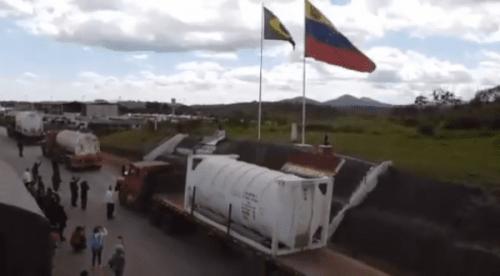Venezuela sends oxygen and doctors to Brazilian Amazon
190 countries around the world have signed onto the COVAX agreement to provide vaccines for the poorest countries.
- Opinión

A large supply of oxygen and one hundred and seven doctors from the Latin American College of Medicine in Caracas, Venezuela arrived on Saturday, January 16, 2021 in Manaus, the capital of Amazonas State in Brazil. The action comes after reports emerged that the city of 2.3 million people had run out of oxygen to treat Covid-19 patients who could not breathe, leaving healthcare workers to administer morphine to ease their suffering as they suffocated.
The oxygen travelled overland on eight trucks, each carrying 18 tonnes (80,000 litres) of the precious gas, on a 1,500 kilometer journey from Puerto Ordaz, near Venezuela’s Atlantic coast. The governor of Amazonas has also arranged for Brazilian trucks to travel in the opposite direction to pick up oxygen tanks from Venezuelan depots, in a direct negotiation superseding Brazil’s federal government, headed by Covid-denier Jair Bolsonaro.
The Brazilian president has made his lack of concern clear. “Everything is pandemia these days. I’m sorry for the dead, but we’re all going to die some day,” he declared, before adding, with some of his characteristic homophobia, that “Brazil needs to stop being a nation of fags.”
Meanwhile, Mexican president Andrés Manuel López Obrador, known as AMLO, accepted the World Health Organization (WHO)’s call and reduced his country’s share of the Pfizer Covid-19 vaccine to avoid “hoarding” and make the vaccine available in poorer countries through the WHO’s COVAX Facility. “In any event,” AMLO explained, “it doesn’t change our plans because we’re already looking at other vaccines besides Pfizer’s … so we will still have enough vaccines.”
According to the Duke University Global Health Innovation Center, one hundred ninety countries around the world have signed onto the COVAX agreement. Only five countries have not: Russia, Kazakstan, Belarus, Greenland and the United States.
COVAX aims to provide enough vaccines to cover only 20% of the populations of low-income countries such as Afghanistan, Eritrea, Mauritania and Honduras. Wealthy nations have already secured contracts to purchase enough vaccine for all their inhabitants several times over. Canada has purchased five times as much as it needs, including vaccines that may not attain approval, but pledges to release unused stock to poorer countries. The Duke Global Health Innovation Center explains:
“High-income countries currently hold a confirmed 4.2 billion doses, upper middle-income countries hold 1.2 billion doses, and lower middle-income countries hold 495 million doses. We have not been able to find evidence of any direct deals made by low-income countries, suggesting that low-income countries will be entirely reliant on the 20% population coverage from COVAX.”
Venezuelan president Nicolás Maduro’s strict imposition of quarantine when the country’s first Covid cases emerged in March, in addition its relative isolation as a result of the blockades imposed upon the country by the world-at-large, explain why Venezuela has one of the lowest rates of Covid-19 contagion in Latin America and can afford to donate the oxygen. Nevertheless opposition leader Juan Guaidó accused Maduro of a political ploy in making the donation. The United Kingdom and the United States recognize Guaidó as Venezuela’s legitimate leader, whereas the European Union announced on January 6 that it no longer does.
Maduro administration chancellor Jorge Arreaza insists that sending oxygen and doctors to Manaus is an act of solidarity. “This is a humanitarian act that must remain above political differences. What unites us is the goal to save lives. We hope the Brazilian government understands the importance of having a good relationship with your neighbours.”
The crisis in Manaus plays a part in the Bolsonaro regime’s general neglect of Brazil’s Blacker, poorer and more liberal North, including the continuing power outages that have strangled the northern state of Amapá, and the decades-long genocide of indigenous peoples in order to make way for industrial exploitation of the Amazon.
Del mismo autor
- El icónico glaciar mexicano Ayoloco ya no existe 29/04/2021
- Venezuela envía oxígeno y médicos a la Amazonía brasileña 21/01/2021
- Venezuela sends oxygen and doctors to Brazilian Amazon 20/01/2021
- France grants citizenship to immigrant essential workers 06/01/2021
- La caravana de los damnificados 29/12/2020
- Honduras: Caravan of the Damned 28/12/2020
- La policía abre fuego sobre protesta contra el feminicidio en Cancún 16/11/2020
- Police Fire on Femicide Protest in Cancún 14/11/2020
- To Our Confederate Dead: Take It Down! 21/06/2020
- Police fire at queer bar owner during protests on first day of Pride 03/06/2020








